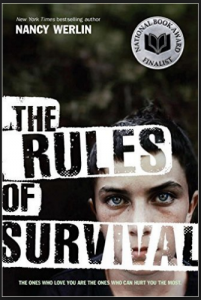Another Literary Analysis by Maya
Citation:
- Werlin, Nancy. Rules of Survival. London: Penguin Books Ltd., 2006.
Reliability:
- I could rely on this book for examples of literary excellence before I read it because Ms. Rosen said the author, Nancy Werlin, is known for using proper writing. She is also a New York Times bestselling author. Rules of Survival was a National Book Award Finalist and an LA Times Book Prize Finalist.
Category:
- Rules of Survival follows a problem-solving pattern: person versus person. Matt and his sisters, Emmy and Callie, struggle to live with their mentally ill mother, Nikki. Matt, who is the oldest, comes across a large man named Murdoch who was protecting a little boy from his abusive father when Matt saw him. Matt soon becomes obsessed with this man and after he eventually finds him, Nikki starts to date him. After they break up, Nikki does everything she can to try and hurt him.
Short Annotation:
- Matt, Emmy, and Callie must find away to cope with living with their mentally ill, and sometimes violent, mother. This 259 page-novel vividly shows the struggles some children face with their parents and is recommended for readers 12-17 years old.
Point of View: First Person:
- “I could telephone Murdoch, too, I thought”(15).
- “I had expected him to do something” (127).
Tense: Past:
- “I knew my face was still perfectly bland” (27).
- “He was enraged” (41).
- “We were better off just sticking it out with Nikki” (82).
Literary Excellence:
- Alliteration: “…almost always…” (37); “…watched the white-capped waves…” (37); “You pumped your feet furiously, fiercely” (143).
- Short Sentences: “I chose.” (28); “Rage? Lust? Restlessness?” (47); “Tilt-A-Whirl. Bumper cars. Three separate roller coasters. Octopus. The Giant Drop.” (56); “I inhaled.” (214); “You just never knew.” (83); “Winter came.” (144); “That’s Aunt Bobbie. A mystery.” (104); “I didn’t know. I didn’t care.” (59); “Fun was always Nikki’s word. Nikki’s goal” (156).
- Metaphor: “…fought her demons…” (90); “Huge doubt filled me, though” (198).
- Appositives: “Of course, at the time, I didn’t know what she was doing, exactly.” (11); “After that, I stayed angry at Ben, but the feeling of desperation…” (71).
- Simile: “It was like a bomb thrown into the room” (109).
- Repetition: “Normal, normal, normal. Normal for us.” (108); “’Mom? Please. Please stop fighting’” (151).
- Synecdoche: “We can keep an eye on each other” (199).
Connection: text to world:
- My connection to Rules of Survival is text to world. I see stories about these kids who have grown up with parents who couldn’t take care of themselves enough to properly care for their kids. I tend to come across a lot that has to do with mental health and how it can affect not only the person with the illness, but everyone around them as well. In this novel, the author never states what Nikki, their mother, has but her mood ranges from being extremely caring to her children to being extremely violent. She likes to have fun, and play “games”. People in real life with these issues often can have their children taken away from them in order to keep everyone safe. People still don’t truly understand how much today’s society is impacted by mental health and Rules of Survival perfectly tells a story about it with our making fun of it.
